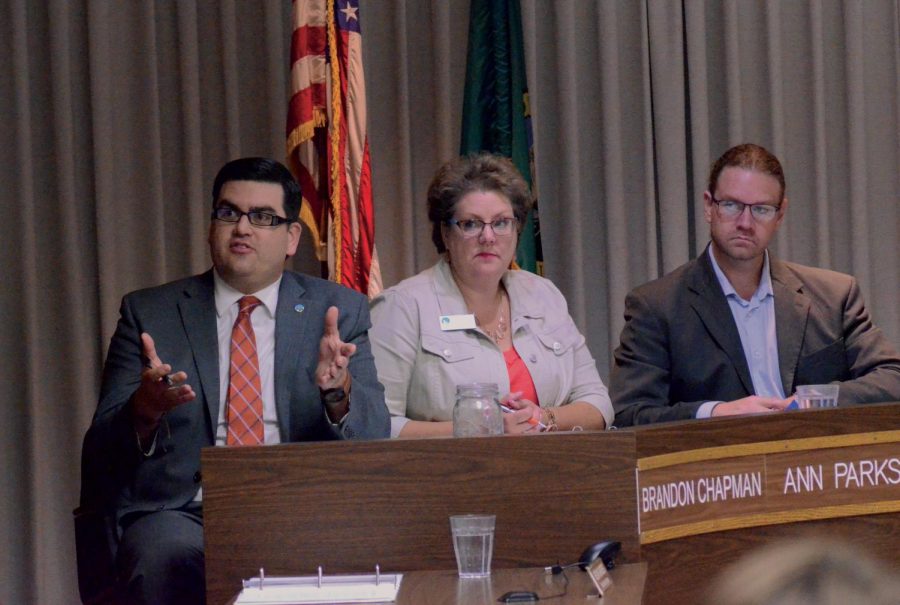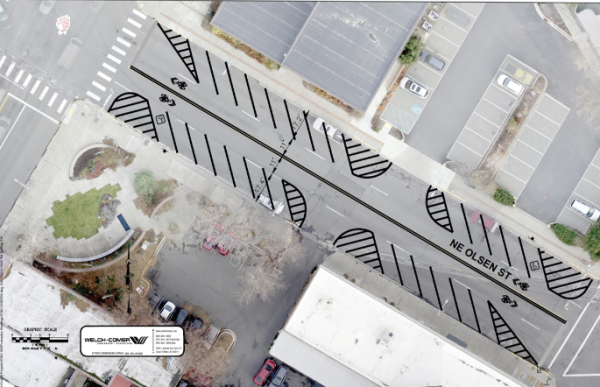Council paves way for new sidewalk rules
Developers will have a month to adhere to approved regulations
JAY SANI | THE DAILY EVERGREEN
Councilmember Brandon Chapman discusses electric buses at a council meeting Tuesday.
June 21, 2018
The Pullman City Council discussed several issues at a meeting Tuesday, including electric buses, a public mural and sidewalk construction.
The council addressed a city policy about the completion of sidewalks in new developments. Currently, developers are required to construct sidewalks within three years of the approval of the development.
Concerns have arisen that this three-year rule has not been enforced and has left some areas in Pullman without adequate sidewalks, Kevin Gardes, director of public works, said.
Councilmember Al Sorenson said developers have been aware of this rule but haven’t been complying and something must be done.
“This is the line in the sand as far as I’m concerned,” Sorenson said, “I want this done. I want them to know we mean business.”
The council discussed the possibility of lowering the three year rule to just one year, effectively requiring sidewalks be built in developments before construction begins.
Many council members were in support of this change, saying it would ensure sidewalks were placed in adequate time and would increase neighborhood appeal and walk-ability.
Kevin Kirkman, principal of KIP Development, spoke against the move because it could create waste.
Kirkland said if sidewalks were put in first, heavy machinery could crack or destroy them during construction. Kirkland estimated that if sidewalks were put in first, by the end of a project, 35 percent would have to be replaced and could cost an additional $3,000 to $4,000, which would be absorbed by homeowners.
Most councilmembers were in support of the change, citing that it was already implemented in Moscow and seemed to be effective.
A notice has been sent to all developers who have failed to meet the three-year rule informing them they must comply within one month. If the developers in violation do not put in sidewalks after the one month period, the city will move forward with a foreclosure on security.
Another topic discussed was the possibility of moving Pullman Transit toward an all-electric fleet of buses, which has been a topic in Pullman Public Works since 2016, Pullman Transit Manager Wayne Thompson said.
Thompson presented his recommendation for a transition toward electric buses and councilmembers showed support for the movement. Pullman Transit will be applying for grant funding for electric infrastructure and one 35-foot all-electric bus in July.
State legislation in 2010 and 2016 requires local governments to begin planning a full transition from traditional buses to electric or biofuel by 2018. Pullman Transit began replacing buses with electric hybrids in 2012.
A financial analysis by Pullman Public Works said even with startup costs to buy new buses and build electric infrastructure, the lifetime cost of all-electric buses was lower than both diesel and hybrid.
“The time has come when it’s just shown that [hybrid] is not the most cost effective option,” Thompson said.
The analysis estimates one all-electric bus would be about $20,000 cheaper in lifetime ownership than one diesel bus.
Thompson said biofuel options were considered but harsh winters can cause biofuel to gel. The option of renewable diesel was also considered, but Thompson said supply could sometimes be unreliable.
“I think the public support is definitely there,” Councilmember Eileen Macoll said. “I’ve had several people talk to me just today and say that the future is electric.”
Councilmember Dan Records said he sees switching to electric buses as an easy decision.
“This is pretty much a no-brainer,” Records said. “This is where we’re going to have to go eventually and the battery technology is only going to get cheaper over time. I don’t see any way around going in this direction.”
The application for the Transit Rural Mobility grant is tentatively scheduled for approval at the July 10 city council meeting.
Also discussed was the High Street Mural. The council approved the mural’s design last October and discussed revisions. Some members, although in support of the project, felt it was necessary for a set of criteria to be created for future projects which outlined the decision making process for approving donated pieces.
In its current form, the design features a variety of winged creatures on a blue background and the WSU Center for Civic Engagement tagline “Be The Change” written in crimson and gray.
The mural project is sponsored by the Pullman Chamber of Commerce, the WSU Museum of Art and the CCE.
Macoll and Sorenson expressed concerns allowing the CCE to effectively advertise their organization through the mural.
“I think we need to get on the same page as a council and decide what we’re going to allow and what we’re not going to allow,” Sorenson said.
Joanna Bailey, interim chair of the Pullman Arts Commission, said supplies and man-power for the project had added up to an in-kind donation of about $2,000.
Bailey said the mural is expected to be completed by the end of this month.
The next city council meeting is July 10.





















